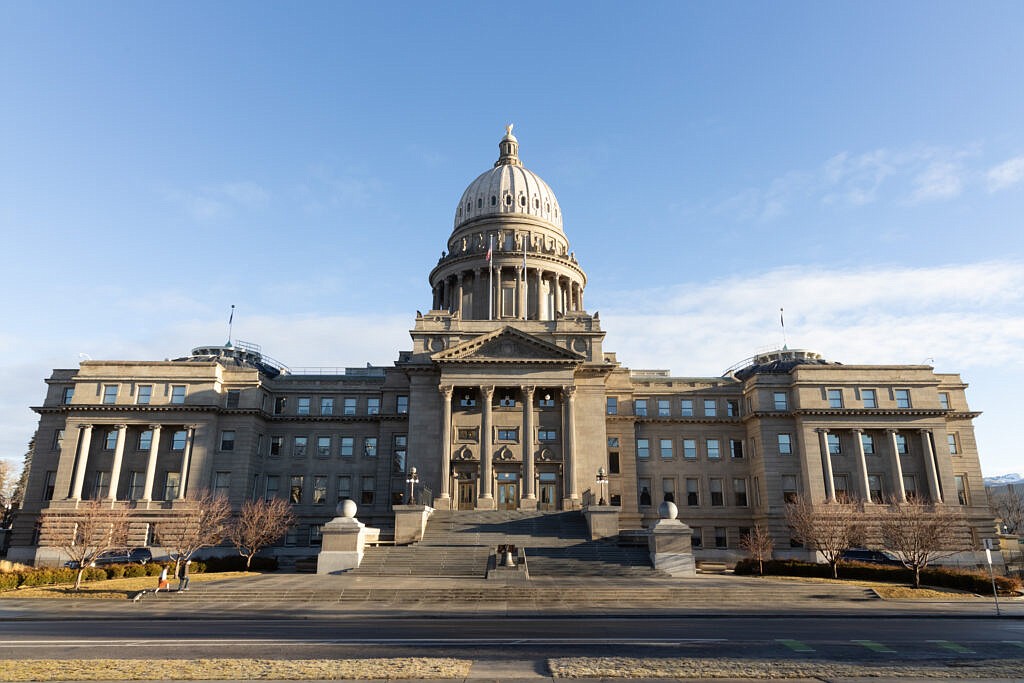‘Taxpayers are asking for relief’: Three property tax bills unveiled in Idaho Legislature
The Idaho Legislature’s House Revenue and Taxation Committee introduced a trio of new property tax bills Thursday morning in an effort to address one of the top priorities facing Idahoans.
Speaker of the House Mike Moyle, R-Star; Sen. C. Scott Grow, R-Eagle; and Rep. Bruce Skaug, R-Nampa, each presented a different property tax bill during the committee’s hearing at the Idaho State Capitol.
The three new bills all take a different approach to attempting to solve the same problem — reducing the amount of money Idahoans pay in property taxes.
“The taxpayers are asking for relief, and they want it on property taxes,” Grow told the House Revenue and Taxation Committee.
Grow’s bill, House Bill 77, would direct 4.5% of the state’s sales tax collection revenue to reducing property taxes on an Idaho homeowner’s primary residence. Grow would also take $150 million from the state’s projected budget surplus to begin offering property tax reductions in the current fiscal year 2023. Grow said the property tax reductions would be calculated and show up as a subtraction from the total amount of property tax due on a homeowner’s property tax notice. The bill would not affect the amount of funding available to local units of government who collect property taxes, Grow said. The property tax reduction component of Grow’s bill also would not apply to reducing the taxes paid on any bonds or levies that local voters approve, he said.
Grow said he thinks the state’s overall tax structure is too high, as evidenced by three years of large state budget surpluses.
Skaug’s bill, House Bill 78, would reinstate and restore the homeowner’s property tax exemption index, which was based on the sales price of Idaho homes but was removed in 2016. After the index was removed, Skaug said nonhomeowner properties and commercial properties experienced significant property tax reductions while homeowner’s saw increases in their property taxes. Skaug’s bill would establish an initial index of $224,360, which is where he said the index would be if it was not removed in 2016.
“For the past six years, homeowners have shouldered an increasing share of the property tax burden,” Skaug told the committee. “For the past six years commercial properties have enjoyed the financial benefits of decreasing property taxes for them.”
Finally, Moyle’s bill, House Bill 79, has several components. If enacted, Moyle’s bill would provide $300 million to school districts, distributed based on their average daily attendance. The money would be required to go toward, in this order, paying off school bonds, paying off school levies, paying expenses for school facilities “and address life, safety and health issues.” If any money is left over, toward savings for future school facilities. On top of that, Moyle’s bill would eliminate the March and August school bond and levy election dates, which would require school districts to run bond issues and supplemental levies only during the May and November elections. A different bill, House Bill 58, would also eliminate the March and August election dates. Finally, Moyle’s bill increases the homeowner’s exemption from $125,000 to $150,000.
“This bill focuses on the education side,” Moyle told the committee.
Moyle’s bill uses funding from several sources to accomplish its goals. It uses $50 million of the $330 million legislators established for the public schools income fund during the Sept. 1 special session, it uses $130 million from the state’s tax rebate fund, it uses $36.9 million from online sales tax collections and it uses $85 million from the state’s projected budget surplus, for a total of about $302 million.
“There are issues that need fixed that these school districts don’t have the funds to take care of. This provides that opportunity,” Moyle said. “(There is) tax relief again on the other side because the taxpayers don’t have to tax themselves to pay for it.”
Each of the legislators who sponsored a property tax bill said they are working to address one of the top issues facing Idahoans. A new Boise State University public policy survey found that 55.9% of Idahoans surveyed believe their property taxes are too high, and 40.5% of respondents said that reducing property taxes would provide the most help to Idahoans.
“We’ve all heard from our homeowners in each of our districts,” Skaug said. “I have no doubt that they want relief. They wanted relief last year. They wanted relief the year before, and we did not deliver.”
Thursday’s hearing was only an introductory, or print hearing, and public testimony was not accepted.
Introducing the property tax bills clears the way for them to return to the House Revenue and Taxation Committee for a full public hearing.
Thursday is the 25th day of the legislative session, which began on Jan. 9. Legislative leaders have set a nonbinding target deadline to adjourn the session March 24.
This story was originally published Feb. 2, 2023, by the Idaho Capital Sun.

